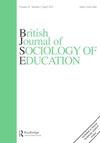提升员工技能?中国改革时期国家技能政策的批判性分析
IF 2.1
3区 教育学
Q1 EDUCATION & EDUCATIONAL RESEARCH
引用次数: 0
摘要
政府报告和文件声称,建设高技能社会是中国国家成功的关键。在本文中,研究了与政府支持的提高技能优先事项相关的八项政策。运用批判性政策分析的原则,本文旨在揭示这些政策中的意识形态预设。本文的研究结果表明,中国政府可能把重点放在了证书的提升上,而不是这些证书所表明的实际技能,从而强化了维持以学术为中心、以证书为导向的霸权主义的意识形式。新政策大力投资“模范学校”,却进一步排斥非模范学校和被边缘化的学习者。这种投资强调技能提供的“供应方”,也导致了培训系统和行业之间更加分散的联系。在新自由主义意识形态的影响下,推动“创业人才培训”,旨在提高年轻人的就业能力和建立知识型经济,可能是一种“自治”的技术。获得技能的责任可能已经转移到学生个人身上,他们将在进入工作的道路上遇到越来越多的不稳定因素。根据葛兰西的霸权概念,本文强调中国的国家技能政策可能进一步促进当前培训不平等形式的再生产,并有助于构建和管理改革时代所需的新自由主义主体。本文章由计算机程序翻译,如有差异,请以英文原文为准。
Upskilling the workforce? A critical analysis of national skills policies in China’s Reform Era
Abstract Government reports and documents claim that building a high skill society is critical for national success in China. In this paper, eight policies in relation to the government’s espoused priorities of upskilling are examined. Applying the principles of critical policy analysis, the paper aims to expose the ideological presuppositions made in these policies. The findings in this paper reveal that the Chinese government may have focused on upgrading the credentials, rather than the actual skills that these credentials signal, thus reinforced forms of consciousness that maintain the academic-focus, credential-driven hegemony. The new policies have vigorously invested in the ‘model schools’, yet further excluding non-model schools and the marginalised learners. This investment, emphasising the ‘supply-side’ of skills provision, has also led to a more fragmented connection between the training system and industry. The promotion of ‘entrepreneurial talent training’, with an intention of enhancing young people’s employability and building a knowledge-based economy, may act as a technique for ‘self-government’ under the influence of a neoliberal ideology. The responsibility of skill acquisition may have shifted to individual students, who will encounter increased precarity on their routes into work. Drawing on Gramsci’s concept of hegemonic power, the paper highlights China’s national skills policies may further facilitate the reproduction of current forms of inequality in training as well as contribute to construct and manage the neoliberal subjects required by the Reform Era.
求助全文
通过发布文献求助,成功后即可免费获取论文全文。
去求助
来源期刊
CiteScore
3.70
自引率
9.50%
发文量
74
期刊介绍:
British Journal of Sociology of Education is one of the most renowned international scholarly journals in the field. The journal publishes high quality original, theoretically informed analyses of the relationship between education and society, and has an outstanding record of addressing major global debates about the social significance and impact of educational policy, provision, processes and practice in many countries around the world. The journal engages with a diverse range of contemporary and emergent social theories along with a wide range of methodological approaches. Articles investigate the discursive politics of education, social stratification and mobility, the social dimensions of all aspects of pedagogy and the curriculum, and the experiences of all those involved, from the most privileged to the most disadvantaged. The vitality of the journal is sustained by its commitment to offer independent, critical evaluations of the ways in which education interfaces with local, national, regional and global developments, contexts and agendas in all phases of formal and informal education. Contributions are expected to take into account the wide international readership of British Journal of Sociology of Education, and exhibit knowledge of previously published articles in the field. Submissions should be well located within sociological theory, and should not only be rigorous and reflexive methodologically, but also offer original insights to educational problems and or perspectives.

 求助内容:
求助内容: 应助结果提醒方式:
应助结果提醒方式:


